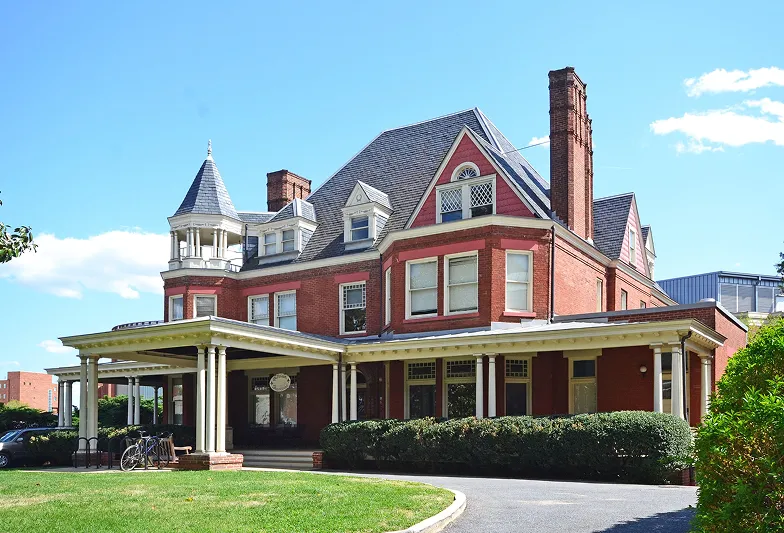At Commonwealth Contractors, our approach to building mirrors my personal philosophy on life, blending practicality with a touch of ingenuity. With a deep respect for classical building principles and a keen eye for modern improvements, you can rest assured that when you collaborate with Commonwealth Contractors, your project will be managed with quality and integrity.
.svg)


Home renovations are making waves, with a striking 55% of homeowners diving into some form of home improvement just last year. As this interest grows, many are seeking a comprehensive home remodel checklist to guide their endeavors. This surge underscores the increasing desire among homeowners to rejuvenate and elevate their living spaces.

But with this excitement comes the inevitable question: "Where do I begin?"
If you're on the brink of a home renovation, you're likely oscillating between exhilaration and a tad bit of apprehension. Whether it's a cozy bathroom update or a full-blown home transformation, the key is preparation. We're the folks from Commonwealth Contractors, and we've seen the ups, downs, and sideways of home makeovers.
In this article, we've whipped up this home remodel checklist for you. It breaks down the nitty-gritty of the process, gives you a heads-up on costs, and reminds you about those pesky permits. Think of it as your renovation roadmap, helping you dodge the potholes and enjoy the ride.
Home Remodel Checklist: A Six Step Guide
.png)
Having a structured plan can make the difference between a dream renovation and a logistical nightmare. Drawing from our extensive experience in the industry, we've curated a step-by-step home remodel checklist to help you navigate the complexities of the renovation process, ensuring a seamless and rewarding experience.
1. Define Your Vision
Every successful home remodel starts with a clear vision. Before you pick up a hammer or select paint swatches, it's crucial to spend time reflecting on what you truly want from this renovation.
- Identify the Need: Begin by pinpointing the areas of your home that require attention. Is it just one room that needs a refresh, or are you considering a whole-house transformation?
- Determine Your Style: Think about the style or theme you're drawn to. Whether it's modern minimalism, rustic farmhouse, or classic elegance, having a defined style will guide your choices throughout the remodel.
- Functionality vs. Aesthetics: While it's great to have a beautiful space, it's equally important for it to be functional. Consider how the changes will improve your daily life. Will an open floor plan make family gatherings more enjoyable? Will adding a second bathroom ease the morning rush?
- Inspiration Boards: Create inspiration boards using platforms like Pinterest or physical mood boards with magazine clippings. This can help you visualize your ideas and provide a reference point for contractors or designers you might work with.
- Set Priorities: If you can't do everything at once, decide what's most urgent or what will have the most significant impact. This will help in allocating your budget and time effectively.
2. Set a Budget
Crafting a home renovation project budget is a critical aspect often overlooked. Surprisingly, a significant 80% of homeowners exceed their initial budget by at least $500. This statistic underscores the importance of setting a realistic budget and factoring in potential unforeseen expenses. Here's a breakdown of the average costs for major parts of a home remodel:
- Kitchen: Depending on the extent of the renovation, a kitchen remodel can range from $12,000 to $50,000. Factors like cabinetry, countertops, and appliances play a significant role in determining costs.
- Bathroom: Given our specialization in bathroom remodels, we understand the nuances of this space. Costs can vary from $6,000 for minor updates to $25,000 for luxury transformations, with elements like fixtures, tiles, and vanities influencing the final tally.
- Living Room: The living room serves as a central gathering space. Renovating this area can cost between $10,000 to $30,000. The size of the room, flooring choices, and any structural changes can impact the budget.
- Outdoor Spaces: Outdoor areas offer an extension of the home's living space. Enhancing patios, decks, or gardens can range from $5,000 to $20,000. The choice of materials, landscaping, and added features like fire pits or outdoor kitchens can affect costs.
3. Research and Gather Inspiration
Even with a clear vision in mind, gathering inspiration is a pivotal step in the remodeling process. While our team offers expert guidance and suggestions, it's beneficial for homeowners to explore various design ideas and trends. Immersing yourself in various inspirations can combine your personal style with home remodeling trends.
- Online Platforms: Websites like Pinterest, Houzz, and Instagram are treasure troves of design ideas. By creating boards or saving posts, you can curate a collection of images that resonate with your style.
- Home Design Magazines: Traditional print media still holds value. Magazines like Architectural Digest, Better Homes & Gardens, and Elle Decor showcase a range of styles and often feature detailed articles on the latest trends.
- Visit Showrooms: If possible, visit local showrooms or design centers. Seeing materials and designs in person can give you a better sense of texture, color, and scale.
- Home Tours and Open Houses: Attending local home tours or checking out open houses can provide real-world examples of design concepts. It's also a chance to see how different elements come together in a space.
- TV and YouTube: Shows like "Fixer Upper" or channels dedicated to home design can offer both entertainment and inspiration. They often highlight before-and-after transformations, giving insights into the potential of a space.
- Feedback from Friends and Family: Sometimes, a fresh set of eyes can offer a new perspective. Share your ideas with friends or family and get their input. They might suggest something you hadn't considered.
4. Understand the Permit Process
Navigating the permit process is an essential step in ensuring your home renovation goes smoothly and legally. Permits are more than just a formality; they are a testament to the safety, legality, and quality of the work being done. Here's a deeper dive into understanding the permit process:
- Purpose of Permits: Permits serve as a checkpoint. They ensure that the planned renovations comply with local building codes, zoning laws, and other regulations. This compliance ensures the safety of the occupants and maintains the integrity of the structure.
- Types of Permits: Common permits include building permits, electrical permits, plumbing permits, and mechanical permits. For instance, if you're adding a new room, a building permit is necessary. If you're updating the electrical system in your kitchen, an electrical permit is required.
- Checking with Local Authorities: Before starting any work, consult with your local building department to understand the required permits and avoid potential legal issues or fines.
- Budgeting for Permit Costs: When setting your renovation budget, it's crucial to factor in permit costs.
- Inspections: Inspections might be required and passing these inspections is vital for the final approval of the work.
5. How to Survive The Construction Process
The significance of planning for the construction process cannot be overstated. Ideally, start this planning at least a month before the actual construction begins, and anticipate the need for adjustments throughout the duration of the project.
- Dust Management: As discussed earlier, managing construction dust is crucial. Use techniques like sealing off areas, using air purifiers, and regular cleaning. This not only ensures a healthier living environment but also protects your belongings from potential damage.
- Temporary Living Spaces: Designate areas in your home where you can live comfortably during the remodel. This helps in minimizing disruptions to your daily routine and ensures a semblance of normalcy even amidst the chaos.
- Communication: Maintain open communication with your contractor. Regular updates can help manage expectations and address concerns promptly. Being informed reduces stress and ensures you're always in the loop regarding the progress of your remodel.
- Safety First: Ensure that safety protocols are in place, especially if you have children or pets. A remodel can introduce various hazards, from tools lying around to exposed wiring, so it's essential to prioritize safety at all times.
6. Plan for the Unexpected
Every renovation journey has its unique set of challenges. To ensure a smooth process, it's prudent to:
- Have a Contingency Budget: Allocate an extra 10-15% of your total budget to cover unforeseen expenses. This cushion can be a lifesaver when unexpected costs arise.
- Be Flexible with Timelines: While punctuality is our hallmark, sometimes external factors can cause delays. It's beneficial to have a flexible timeline to accommodate such instances.
- Stay Informed: Regularly check in with your contractor for updates. Being in the loop allows you to make timely decisions if changes are needed.
- Prepare for Temporary Disruptions: Depending on the scope of the remodel, you might need to make temporary living or storage arrangements.
- Document Changes: If there are any deviations from the original plan, ensure they are documented. This helps in keeping track of adjustments and their associated costs.
What to Expect During Your Home Remodel?
Starting a home remodel is a big decision. It's not just about the final look, but also about understanding each step along the way. A good home remodel checklist can be a lifesaver. We've been through this process many times and know the ins and outs. Our goal is to help you feel prepared and confident. Below, we'll walk you through what to expect during the remodeling process, so there are no surprises.

Initial Consultation and Site Visit
During the initial consultation, we'll delve into your vision, needs, and preferences for the remodel. Our team will then conduct a site visit to assess the current condition of your home, pinpointing both potential challenges and opportunities to enhance the space. This foundational step ensures we align our strategies with your aspirations.
Design and Planning
After understanding your vision, we'll draft detailed blueprints and mock-ups for a clear visual of the anticipated outcome. Additionally, we'll assist you in choosing materials and finishes that resonate with your preferences and fit within your budget.
Demolition
Before introducing the new, we prioritize removing the outdated elements of your home. Our team ensures this demolition phase is executed safely, causing minimal disturbance to the surrounding areas.
Construction
Should your remodel require structural alterations, we commence with foundational tasks to guarantee stability. This stage encompasses erecting walls, ceilings, and other structures, as well as adjusting plumbing, electrical, and HVAC systems as necessary.
Finishing Touches
Upon completing the primary construction, our focus shifts to final touches like flooring and wall treatments. We also install essential fixtures and conduct a rigorous inspection to ensure the design's fidelity and uphold quality benchmarks.
Post-Construction Cleanup
After the remodel, we prioritize cleaning up, ensuring all remnants of construction are cleared away. We also undertake a thorough sanitization of the renovated space, prepping it for immediate use.
Final Walkthrough
To conclude, we accompany homeowners on a walkthrough of the transformed space, ensuring the results align seamlessly with their expectations.
Feedback Session:
Understanding the building process can make the remodeling journey smoother and less stressful. With clear expectations set, homeowners can feel more in control and excited about the transformation their home is undergoing.
Home Remodel Projects with the Best Return on Investment
Completing a home renovation successfully requires a strategic approach, especially when aiming for a substantial return on investment. A 2023 CNBC report sheds light on the varying financial outcomes of different home remodeling projects:

Curb Appeal Enhancements
The first impression of a home often sets the tone for its perceived value. Enhancing your home's curb appeal can significantly increase its market worth, often with a remarkable return on investment. By focusing on strategic exterior updates, homeowners can make their property stand out and appeal to potential buyers. Here are some pivotal enhancements:
- Garage Door Replacements
- Stone Veneer Installations
- Upgrades to Steel Front Doors
- Landscaping Improvements
- Exterior Painting
- Outdoor Lighting
Efficient HVAC Systems
Transitioning to an electric heating, ventilation, and air conditioning system stands out, with some cases showing up to a 100% return on investment.
Minor Kitchen Refurbishments
Investing in targeted kitchen refurbishments can significantly boost your home's value, often at a fraction of the cost of extensive renovations. By concentrating on specific updates, homeowners can achieve a substantial return on investment, ensuring that every dollar spent translates into increased home equity.
- Cabinet Refacing
- Countertop Upgrades
- Energy-Efficient Appliances
- Backsplash Installation
- Flooring Upgrades
- Lighting Enhancements
- Island Addition
Choosing Commonwealth Contractors for Your Home Renovation Project
When it comes to tackling a home renovation journey requires a trusted partner, and the choice of contractor can significantly influence the outcome.
.webp)
Here's why choosing us, Commonwealth Contractors, is a decision you won't regret:
Full-Service Design + Build Team
At Commonwealth Contractors, we provide a comprehensive service, seamlessly guiding projects from the initial concept to the final touches. Our approach ensures every aspect of the renovation is executed with unmatched expertise and precision.
Experience and Expertise
Holding a Class A contractor license and having a strong presence in central Virginia, we are proud of our extensive portfolio that includes custom home builds and diverse interior and exterior renovations. Our years in the field have equipped us to handle a myriad of projects, confidently addressing any challenges that arise.
Personalized Approach
We firmly believe that a home is more than just bricks and mortar; it's a reflection of the homeowner's distinct personality and lifestyle. This belief motivates us to design and craft homes that not only fulfill but surpass client expectations.
Transparent Process
Our work process is designed with transparency at its core. From in-depth consultations to utilizing the Buildertrend management system, we ensure our clients remain informed and engaged at every stage, eliminating any room for unexpected surprises.
Community-Centric
For us at Commonwealth Contractors, building homes goes hand in hand with building communities. Our active participation in the Charlottesville community underscores our commitment to enhancing not just individual homes but the broader community's value.
Stellar Reviews
Our reputation is a testament to our dedication. With over 30+ 5-star reviews, our unwavering commitment to quality, collaboration, and integrity has garnered us the trust and admiration of countless satisfied customers.
Undertaking a home renovation is a monumental step. With Commonwealth Contractors by your side, you can be assured of a journey that is smooth, efficient, and culminates in a space that resonates with your vision and aspirations.

.svg)
%2520(2)%2520(1).webp)




.webp)
.webp)



.webp)
.webp)











.webp)
.webp)

.webp)
.webp)
%2520(1).webp)
%2520(1).webp)
%2520(1).webp)

.webp)
.webp)
%2520(1).webp)
%2520(1).webp)

%2520(1).webp)
%2520(2).webp)

%2520(1).webp)
%2520(2).webp)
.webp)



.webp)
.webp)
%2520(2).webp)
.webp)
.webp)
%2520(1).webp)

.webp)
%2520(3)%2520(1).webp)
.webp)
%2520(1)%2520(1).webp)
.webp)
%2520(1).webp)